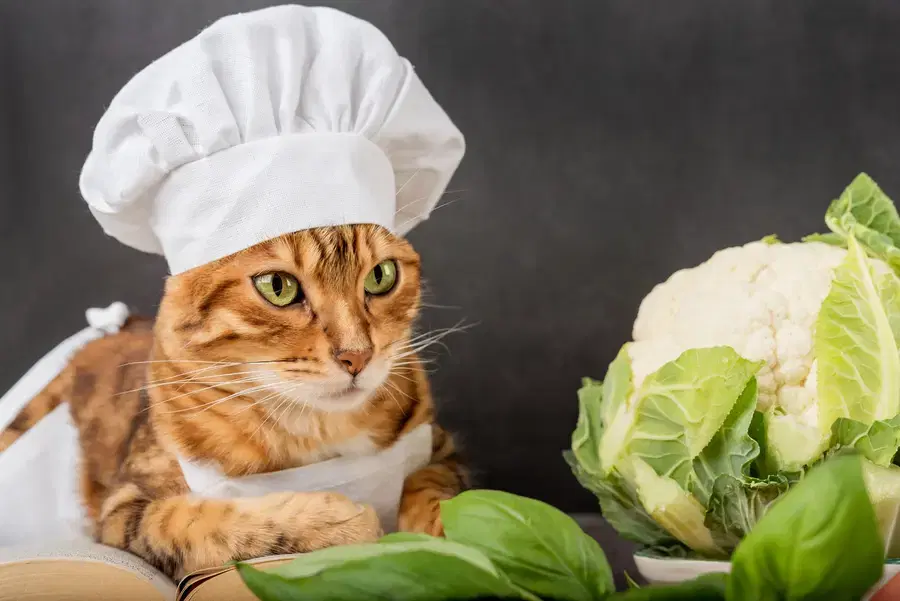Cats are obligate carnivores, which means that their diet should consist of mostly meat and little else. Since veggies are predominantly fiber and carbohydrates, they are not nutritionally suitable for your feline.
Can Cats Eat Vegetables?
Veggies include a variety of micronutrients that are useful to humans, but cats cannot absorb the majority of these nutrients because their digestive tract is built to handle meat. Aside from providing little to no nutritional value, certain vegetables are particularly harmful to cats.
Here is a list of vegetables that are considered safe for cats to consume:
What Vegetables can Cats Eat?
Can Cats Eat Broccoli?
You can give your cat broccoli to help with their bowel movements and to soothe an upset stomach, but it must be cooked and allowed to cool first. Steaming broccoli gently maintains the most nutrients and softens it. Steaming is a great option if you are preparing broccoli for your cat.1
Broccoli should only be served on rare occasions since it might induce diarrhea.
Can Cats Eat Pumpkin?
Small quantities of cooked pumpkin can relieve constipation. If your cat has a sensitive stomach and frequent indigestion, several veterinarians recommend incorporating pumpkin into their diet.
If you plan to serve any pumpkin, you must boil it beforehand. Remove the seeds; they can clog your cat's airways and cause choking.
Can Cats Eat Green Beans?
Many other green vegetables, such as peas and green beans, are perfectly safe for your cat to eat and can play an important role in a healthy diet.
When cooked, fresh or frozen green beans can provide numerous health benefits. If you are going for canned green beans, make sure they are low in sodium, since too much sodium can be hazardous for your cat.
Green beans may be the most helpful of all because they serve as a source of fiber and can help with your cat’s digestive system and weight management. Green beans, like carrots, contain a moderate amount of oxalates, so limit this vegetable for cats who have a history of bladder problems.
Can Cats Eat Chickpeas?
Chickpeas offer kitties “protein, iron, copper, zinc, and magnesium,” not to mention a protein boost.
Can Cats Eat Sweet Potato?
Sweet potatoes are fantastic complements to protein-rich meals. Feed your cat a tiny bit of soft (baked or steamed) sweet potato if they need more fiber. Too much can lead to upset tummies, so take it easy.
What Vegetables Should Cats Not Eat?
Some veggies are so hazardous to cats that even the smallest quantity can cause poisoning and death.2 Contact your vet immediately if your kitty has eaten the following veggies.
Can Cats Eat Garlic?
Garlic is the most poisonous of the allium vegetables, capable of destroying your cat's red blood cells. Even a single clove of garlic can cause hemolytic anemia and severe gastroenteritis. If these illnesses aren’t addressed quickly, cats can experience organ damage and death.
Can Cats Eat Tomatoes?
Tomatoes contain solanine, a natural insecticide particularly poisonous to cats. Not even cooking tomatoes will lower solanine to acceptable levels, so cats shouldn’t consume tomatoes.
If your cat manages to take a bite out of a tomato, observe them for the following 24 hours. Take them to the vet if they display any of the following symptoms:
Diarrhea
Vomiting
Loss of appetite
Lethargy
Dilated pupils
Disorientation
Drooling excessively
Can Cats Eat Onions?
Onions are very toxic to cats in all forms, including raw, cooked, and powder. Onions attack and break down feline red blood cells, which can lead to death if not treated quickly. Signs of onion toxicosis include:
Vomiting
Diarrhea
Lethargy
Fainting Anaemia
Bloody urine
Elevated heart rate
If your cat consumes onions, take them directly to the vet.
Expert Insights From Spot
Offering your cat a taste of your favorite foods might seem harmless, but it's important to remember that not all human foods are safe for pets. Spot's internal data reveals that pet insurance claims for dietary indiscretions average $642*, emphasizing the necessity of thorough research and caution when treating your cat with human foods.
Cat Nutrition According to Age
According to VCA Hospitals, it is critical to consider a cat's life stage when trying to meet their nutritional needs. The requirements of senior cats and newborn kittens are vastly different. Cats with chronic or acute health issues may also require dietary changes based on how their bodies metabolize food.
What Are the Dietary Needs of Kittens?
Kittens' dietary needs after weaning off their mother's milk (at about eight weeks old) include food that will help build robust immune systems and support their development throughout early adulthood. Their diets should include a lot of protein, some healthy fats, and a little calcium. Tossing veggies into your kitty's food at this early stage is not a good idea. Kitten food formulae are meant to promote optimal growth, and meddling with their systems early could be detrimental.
What Are The Dietary Needs of Adult Cats and Senior Cats?
When trying new foods, young adult and adult cats (typically between the ages of one and ten) are far more adaptable. They should drink plenty of water and consume plenty of protein. Some fat is still beneficial, however it may be beneficial to add fiber to their diet. According to VCA Hospitals, this is beneficial for inactive cats since it helps them feel full and avoid overeating. Keep in mind that your cat's breed will decide how long they will be a kitten. Some, like Maine Coons, aren't considered completely grown until they're over three years old.
Senior cats (ages 11 to 14) and geriatric cats (ages 15 and more) require very specific diets to maintain their overall health. Because many cats develop bladder or kidney problems later in life, you may need to start giving them items that help these organs. The same applies to diseases such as arthritis, cancer, and heart disease. Older cats also tend to become less mobile while losing body mass, so consult with your doctor about how to achieve a healthy balance.
How Can I Introduce New Foods to My Cat?
While deciding what to feed your cat and how often they should eat, always consult with your veterinarian. If you are given the okay to introduce veggies into your cat's diet, start with a small bit of any vegetable and observe your cat for two days to determine if they have any allergy symptoms. Look for rashes, vomiting, and diarrhea.
Vets strongly encourage scheduled meals rather than free feeding. In other words, rather than leaving a heaping mound for your cat to graze on as they like, dish out your cat's food at the same meal time(s) every day.
How to Prepare Vegetables for Your Cats
Never give your cat vegetables that have been sautéed with oils, seasoned with herbs, or smothered in sauce. Vegetables should be served steamed or baked until mushy and chewy. Make sure you've also cut them into bite-sized pieces or mashed them.
Benefits Of Vegetables For Cats
Remember that vegetables are not required in your cat's diet, but adding vegetables to can provide them with a few health benefits. As a general guideline, treats and supplements should account for no more than 10% of your cat's daily calories. Vegetables provide nutrients like magnesium, potassium, fiber, vitamins, and antioxidants that can help enhance your cat's immune system and ease digestion.
Vegetables can be a low-calorie alternative to traditional cat treats, but as with any nutrition plan, ask your veterinarian about your cat's unique needs first. There are plenty of vegetables on the market, but only serve your cat vegetables that are both safe and useful.
Conclusion
Most veggies are generally regarded as safe, but should only be given as a treat and should not make up the majority of a cat's diet. Always visit your veterinarian to discuss which veggies are appropriate for your pet. If veggies upset your cat's stomach or if your cat appears ill after eating vegetables, remove them from their meals and schedule a visit with your vet.
Alternatively, here’s a list of fruits that cats can eat; apricots, strawberries, blackberries, blueberries, cranberries, and dragonfruit.

The resident animal enthusiast at Spot. I have a lifetime of pet parent experience. If it has fur, feathers, or scales, I’ve probably shared my home with it. I aim to be a reliable source, blending experience with a dedication to the well-being of pets.
*Jan 2019 to Aug 2024 Spot Pet Insurance Services, LLC claims data.
Crusta, Mallory. "5 Vegetables Cats Can Eat," Cats, 7 Sep. 2022, https://cats.com/can-cats-eat-vegetables.
McCoy, Jude. "Can Cats Eat Vegetables?" Bella and Duke, 08 Aug. 2025, https://www.bellaandduke.com/learn/cat-nutrition/can-cats-eat-vegetables.
The information presented in this article is for educational and informational purposes only and does not constitute or substitute for the advice of your veterinarian.












